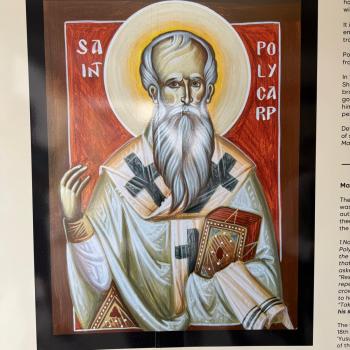BEN: Let’s talk about the circumcision of the heart, an important idea in both the OT (p. 37) and the NT. On the face of it, the text of Deut. 10.16ff. indicates that God’s people must circumcise their own hearts— they must repent, not be hard-hearted etc. and turn back to God and thus be able to love God. But in the NT this act of internal circumcision seems to be the work of the Spirit. It seems to be something humans can’t do for themselves or to themselves, at least not without divine help. How do you view this matter? Where should the emphasis lie?
PATRICK: That’s a very interesting question. I think there are strong continuities here OT to NT. In both cases the great good news is God’s prior love which elicits a human response of love in return.
The chapter on Deuteronomy 10 is called ‘God’s love for the outsider’. Love is a major theme in Deuteronomy (think the Shema of 6:4-5) and in chapter 10 Israel is told to “love the stranger, for you were strangers in the land of Egypt” (10:19). Verse 19 is paired with verse 16, “ Circumcise, then, the foreskin of your heart, and do not be stubborn any longer.” Their love of the ‘Other’ does not come naturally, it requires repentance and a turning of their hearts (the seat of identity) to God. What ‘circumcision of the heart’ seems to mean here is internalizing the generous and indiscriminate love of Yahweh himself who “defends the cause of the fatherless and the widow, and loves the foreigner residing among you, giving them food and clothing” (10:18) and remembering how they themselves were beneficiaries of such life-saving love.
There is a strong continuity here with Paul’s talk about true circumcision being a matter of the heart, a spiritual response to God not merely an external physical act (Rom 2:28-29). In both cases circumcision of the heart has to do with appropriate human response to God’s prior love. Yet it is not all dependent on human will. Deuteronomy 30:6 locates heart circumcision with God: “Moreover, the Lord your God will circumcise your heart and the heart of your descendants, so that you will love the Lord your God with all your heart and with all your soul, in order that you may live.” In the NT, it seems to me, this promise is fulfilled in the gift of the Spirit whose fruit is primarily love. Again, there is both continuity and discontinuity – the Spirit enables believers to love and be in relationship with God and one another in a way that was not available in the OT.
BEN: There is a strong emphasis in your book on the church being the church, and you see the social side of the Gospel as a sort of overflow to local communities, but not a matter of a direct focus on the world and changing the world (p.283 especially). I was thinking about the Salvation Army while reading this, and thinking they at least would strongly disagree with some of this, with the church focusing on itself and loving itself, and simply being an alternative witness, rather than having a direct prophetic ministry in the culture, and a reaching out to better the culture quite apart from evangelism. John Wesley once said there is no spiritual holiness without social holiness, and he went about prodding Wilberforce to get the abolition legislation passed in Parliament to the day he died. He went about founding orphanages, and poor houses, which is eventually where General Booth got the idea. I know you are not talking about the church becoming like the Amish, and withdrawing from culture and society, but could you articulate for us what you do mean to say a bit more clearly?
PATRICK: One theme that was continually reinforced for me in researching chapters on the Old Testament and the New, is how the Bible’s overwhelming emphasis is on the spiritual authenticity of the community of the people of God, called to obey and imitate their God in every aspect of their lives together. And love is what that life together looks like. I say on the page you mention that “There is virtually no focus, Old Testament or New, on transforming the world outside the covenant community.” Love for God and each other is the missional task of the Church.
Now, as your question suggests, that sounds like a pretty insular thing to say! If seems to fly in the face of a lot of evangelical social and political activism, but I think we need to take seriously how uniform Scripture is on this theme. I believe that the primary calling of the church is to be the church – a foretaste of God’s kingdom and justice in the present. I worry when I see Christians ‘leaving the church behind’ and becoming consumed with making this world a better place through social and political action. I wonder if this turn to politics is in part a disillusionment with the church and a lack of confidence in the gospel – as if persuading those in power to do the right thing will advance the kingdom. In contrast, I’m struck by Jesus’ and the New Testament’s rather magnificent disinterest in the affairs of Empire. The real king of the world is the risen Lord.
This is not to say Christians in their individual lives, and local churches in their communities, should not be busy showing God’s love and justice with those in need around them (Galatians 6:10; 1 Peter 2:9-12). This is a ‘bottom up’ witness to the world, not a Christendom ‘top-down’ attempt to control levers of power. I could start to comment on (some) evangelicals in your part of the world Ben and their apparently uncritical support of a certain President in order to advance Christian values through profoundly unchristian means – but I’ve probably said too much already!
BEN: Interesting that you brought that up, your fellow resident of Dublin, who is certainly a Christian, by whom I mean Bono, would disagree with your reading of the material rather strongly. But I don’t disagree that the primary mission is for us to be the church in the world and fulfill the great commandment as well as the great commission. Nor do I disagree with your critique of things in America where the civic and Christian religion are syncretized in unhelpful and unBiblical ways.













